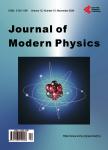Flat Space Cosmology as a Model of Light Speed Cosmic Expansion—Implications for the Vacuum Energy Density
Flat Space Cosmology as a Model of Light Speed Cosmic Expansion—Implications for the Vacuum Energy Density作者机构:760 Campbell Ln. Ste. 106 #161 Bowling Green KY USA Honorary Faculty I-SERVE S. No-42 Hitex Road Hitech City Hyderabad India
出 版 物:《Journal of Modern Physics》 (现代物理(英文))
年 卷 期:2018年第9卷第10期
页 面:2008-2020页
主 题:Cosmology Theory General Relativity Dark Energy Cosmic Flatness Cosmic Entropy Entropic Arrow of Time Cosmic Inflation Milne Universe Black Holes Cosmological Constant Problem
摘 要:Cosmologists have long ignored a stipulation by quantum field theorists that the vacuum pressure p corresponding to the zero-state vacuum energy must always be equal in magnitude to the vacuum energy density ρ(i.e., p=ρ). Although general relativity stipulates the additional condition of proportionality between the vacuum gravitational field and (ρ+3p), the equation of state for the cosmic vacuum must fulfill both relativistic and quantum stipulations. This paper fully integrates Flat Space Cosmology (FSC) into the Friedmann equations containing a cosmological term, with interesting implications for the nature of dark energy, cosmic entropy and the entropic arrow of time. The FSC vacuum energy density is shown to be equal to the cosmic fluid bulk modulus at all times, thus meeting the quantum theory stipulation of (p=ρ). To date, FSC is the only viable dark energy cosmological model which has fully-integrated general relativity and quantum features.



